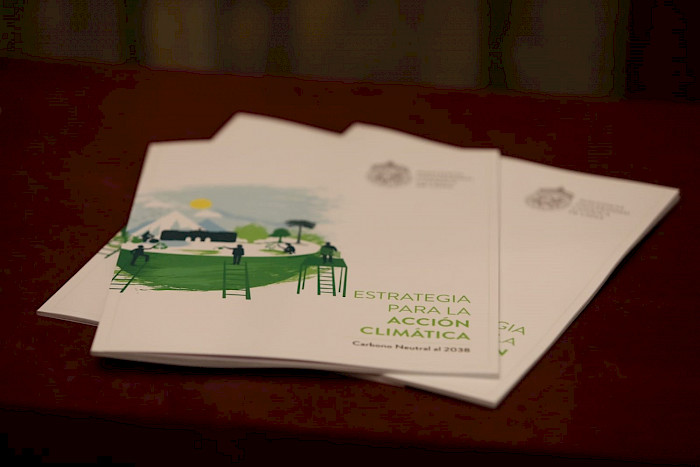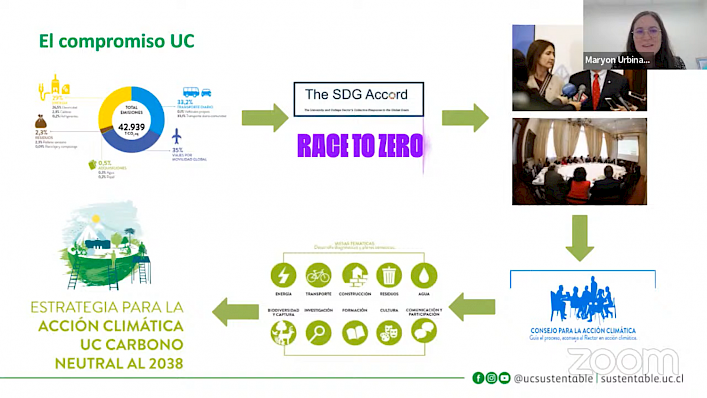UC Chile joined the International Sustainable Campus Network
04 July 2024
In pursuit of our committed goal of carbon neutrality by 2038, UC Chile joined the International Sustainable Campus Network (ISCN), network that brings together over 100 universities in 35 countries across six continents providing an international forum to support higher education institutions in exchanging information, ideas, and best practices to achieve sustainable campus operations.

photo_camera At UC Chile, sustainability is viewed as a collective effort for the ongoing well-being of humanity and other life forms on Earth.(Photo: Revista Diálogos)
At UC Chile, sustainability is viewed as a collective effort for the ongoing well-being of humanity and other life forms on Earth. Based on this principle, our institution participates in collaborative networks within Chile, such as the Red de Campus Sustentable (Sustainable Campus Network), and in international initiatives like Race to Zero.
This year, in pursuit of our committed goal of carbon neutrality by 2038, UC Chile joined the International Sustainable Campus Network (ISCN).
As explained by Victoria Smith, Executive Director of the International Sustainable Campus Network (ISCN), this network brings together over 100 universities in 35 countries across six continents, providing an international forum to support higher education institutions in exchanging information, ideas, and best practices to achieve sustainable campus operations and integrate sustainability into research and teaching. "We are very impressed with the leadership that UC Chile has demonstrated in sustainability, and we look forward to the numerous contributions they will make as committed members of ISCN," she added.

The ISCN is a global network of universities that facilitates international communication to support higher education institutions in exchanging information to incorporate sustainability into education and research and achieve sustainable campus operations. Institutions signing the ISCN commitment letter share the goal of working to reinvent the future and take actions that contribute to sustainable development.
"We are very impressed with the leadership that UC Chile has demonstrated in sustainability, and we look forward to the numerous contributions they will make as committed members of ISCN," stated Victoria Smith, Executive Director of the International Sustainable Campus Network (ISCN)
Share
"Since 2010, our university has demonstrated a steadfast commitment to sustainability. Since then, numerous initiatives and projects have been implemented to promote, by example, the care of our planet, our common home. We are very pleased to join this renowned international network for sustainability in higher education, and we hope that UC Chile's participation will enrich our work, as well as allow us to share our experiences and the lessons we’ve learned to date," stated Guillermo Marshall, Provost of UC Chile.

The agreement among these higher education institutions is to utilize their tools to reimagine the future and take meaningful action to contribute to sustainable development. Additionally, they demonstrate a commitment and provide evidence of sustainability throughout the institution in governance, teaching/learning, research, student experience, campus operations, reporting and communications, and community outreach and engagement.
For more information, please click here.
Decarbonizing the Future
In 2018, UC Chile, Tecnológico de Monterrey in Mexico, and Universidad de los Andes in Colombia launched "La Triada," a collaboration initiative to collectively address the opportunities and challenges posed by the current socio-environmental crisis in our region.
This year, on April 4th, the La Triada members held a virtual forum titled "Universities in Latin America and the Caribbean - Decarbonizing the Future," to share their experiences in making their campuses more sustainable.
Maryon Urbina, UC Chile's Director of the Office of Sustainability, who participated in this event, emphasized the role universities play in leading decarbonization efforts. "This role extends within our communities, including our students who spend five or six years on our campuses and then graduate. Therefore, the impact they can have through their education and sustainability experience on our campuses is tremendous," she stated.

During her presentation, Maryon shared part of UC Chile's sustainability journey, such as measuring the institution's first carbon footprint in 2013, joining the Sustainable Development Goals (SDG) initiative that underscores the crucial role of education in achieving the Sustainable Development Goals (SDGs); participating in the Race to Zero campaign for a healthy, resilient, and carbon-free recovery; and committing to make UC Chile a carbon-neutral university by 2038. She also reported on establishing the Climate Action Council, a tripartite body within our university that led and provided guidelines for developing the UC Chile Climate Action Strategy, launched in October 2023.
"Universities face two challenges to achieve this decarbonization goal. The first is institutional commitment, which must be integrated into development plans, and the second involves cultural change that must permeate every issue, inside and outside our institutions, to transform society," Maryon concluded.
Each of these initiatives represents collaborative efforts, extending beyond our borders, aimed at addressing the socio-environmental crisis facing humanity through higher education institutions.




